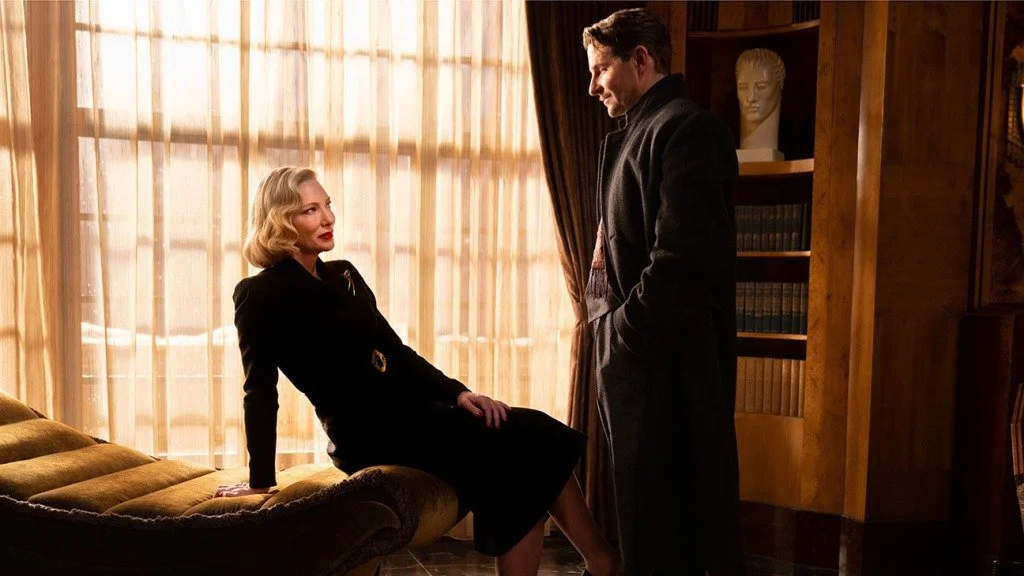NIGHTMARE ALLEY
Directing: B+
Acting: B+
Writing: B+
Cinematography: A
Editing: A-
Nightmare Alley has a beautifully shot, gorgeous production design, and is editing in such a way that you don’t quite register its skillful construction until well into its second half. Which is to say, this film noir by the exceptionally gifted director Guillermo del Toro is a bit of a slow burn, but one that really pays off.
I have to admit some relief in how much I enjoyed this movie. Del Toro has a bit of a spotty history when it comes to my own tastes; Pan’s Labyrinth—my 10th-favorite movie of 2006—made an indelible impression, whereas the widespread acclaim and love for The Shape of Water (otherwise known, by me anyway, forever as Elisa Fucks a Fish) in 2017 left me legitimately bewildered. If nothing else, this is a director with a sensibility all his own, even as he veers into disparate genres.
In fact, Nightmare Alley is a departure for him in how straightforward it is. Instead of featuring anything truly paranormal, this is about carnival workers and illusionists who dupe people into thinking something supernatural is going on, but it’s all just smoke and mirrors (sometimes literally). I kept half-expecting the story to veer into something otherworldly, just because it would be on brand for del Toro, but this is a story entirely rooted in the real world.
This brings me back to the cinematography and production design, because these things alone give the film a look and tone that stops just short of feeling otherworldly. It’s a big part of why it’s easy to wonder whether we might see some magic onscreen.
Instead, the first hour or so is comparatively gritty, as we see Bradley Cooper’s Stanton Carlisle wander his way into a job with a traveling carnival. Most of the characters here are not seen again once the setting changes dramatically and the story skips forward two years, and yet a bunch of Stanton’s fellow carnies are played by a parade of famous faces: Willem Dafoe as their leader; Ron Pearlman as the strong man; Toni Collette as “Zeena the Seer,” David Strathairn as Zeena’s magician husband; and Rooney Mara as Molly, the woman who can withstand electrical current—and who develops a relationship with Stanton and thus goes away with him, ultimately developing a lounge act of their own.
It’s too bad so many of those great actors, while making for a great ensemble, don’t get any scenes that truly showcase their talents. This changes with a couple of new characters after the dramatic setting shift in both time and place, and we get the reliably fantastic Richard Jenkins as eccentric millionaire Ezra Grindle; and easily the best reason to see this film at all, Cate Blanchett Dr. Lilith Ritter, the psychiatrist who treats both Grindle and his wife, and who is slowly convinced to plot with Stanton to take Grindle as a mark.
I suppose the wild breach of ethnics involved in using recordings of patient sessions, in order to be convincing as a “mentalist” who can reads minds, is immaterial to the overall story here. It’s plot mechanics, but Guillermo del Toro has them well oiled. It takes a while even to figure out whether we (or Stanton) are supposed to trust Lilith, which is how things go for the mysterious women of film noir.
I mostly appreciate Nightmare Alley just for how cleanly the story winds up coming together. Spending so much time with Stanton working the carnival seems, in the moment, like a pointlessly extended prologue. But, he’s spending that time learning about the nefarious ways in which the carnival takes people for their money, in many cases exploiting both people and animals in rather disturbing ways. One of these ways is the basis for a bit of a plot twist at the end, which I saw coming about five minutes ahead, but I don’t mind predictability so long as it’s satisfying.
And I found Nightmare Alley to be very satisfying—surprisingly so, in fact, after the extended first act somewhat alters expectations. This movie isn’t necessarily the movie you expect going in, but it arrives at something else that still manages to be all that was hoped for it in the end. The fact that it takes a while for that to become clear is part of what makes it work. This is a film that makes you wonder whether it’s working at first, and then proves itself. Whether that’s what del Toro intended is anyone’s guess, but ultimately this is a movie that competently speaks for itself.
Just when you think you’ve got the tables turned, you find yourself turned around.
Overall: B+

